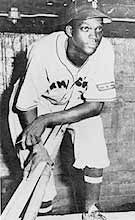![]()
Davis was a product of the industrial leagues that surrounded the Birmingham area. These league consistantly supplied the Black Barons with talent. Born in Alabama coal-mining town called Piper, Lorenzo so nicknamed after he left his hometown.
In high school Piper (then still Lorenzo), attending all-black school in the neighboring Fairfield, would earn himself a scholarship to Alabama State University for his excellence in basketball. Piper spent a year starring on the Alabama State team, but had to withdraw from college due to financial difficulties. Nonetheless, Piper always felt it important for his children to go to college. "One year Daddy came home, we went to every college within a 300 or 400 miles radius" said his daughter, Faye. (Faye ended up attending Taladega College.)

Lorenzo "Piper" Davis


Piper (middle row, first from the right) was one of the stars on the pennant-winning 1944 squad
Shortly thereafter, Piper found employment in a Birmingham Steel Mill. He would star on many industrial teams throughout the area. In 1936, Davis landed on the barnstorming Omaha Tigers (barnstorming is what it was called when a team traveled from town to town in search of a game). Davis' taste of the Negro Leagues was short-lived, financial difficulties forced him back into the mills and to play in the industrial leagues. One of the best teams in the area was out of a company called ACIPCO. Davis and future Black Baron teammate Artie Wilson starred on those teams, (which teams, links,etc.)
Piper led the Black Barons team the Negro American League Pennant in 1943, and then took the Homestead Grays for seven games in the Negro League World Series. The next year, the Barons were again unable to overcome the Grays and 4 years later, in what would be the last Negro League World Series, the Barons lost to none other than the Homestead Grays.
Davis was well-respected as the team's leader, and soon became manager.(year?) Players called him "Skip." "If Skip said you was going leave at 2:30, 2:31, if you wasn't there, you were left. The bus driver's name was a man named James Rudd, and Daddy would say 'Rudd, let's go.'" Davis was a stern yet respected manager. Players always listened to him.
The owner of the Birmingham Black Barons throughout the 1940s was a man by the name of Abraham Saperstein, who was also the owner of the famed Harlem Globetrotters basketball squad. Piper Davis, having been a star in high school, was recruited to play and travel with the Globetrotters. For two seasons, Davis played baseball in the summers and basketball in the winters. Playing so much soon caught up with Piper. He started experiencing involuntary shaking, and was forced to revert back to just playing baseball.
While Davis was being honored in 1990 at a baseball game in Kansas City, he saw Bo Jackson sitting in the dugout, his legs quivering madly. Davis told Bo, "Now that is when your body is really telling you something." The next fall, Jackson suffered a career ending football injury. His baseball career continued though never the same.
So, Piper went to play in the Pacific Coast league, maintaining his solid hitting and fielding. After a couple of years there, the team honored Davis. During the "Piper Davis Day" game, he played every position on the field, moving to a new spot every inning.
Piper then played a couple of seasons in Puerto Rico before retiring and becoming a scout for the Detroit Tigers and the St. Louis Cardinals covering Alabama and Mississippi.